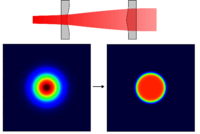Postdoc Positionen

Bachelor-/Masterthesis
Motivation:
Although Gaussian beams have excellent properties for beam transport, it is common practice in high-energy laser systems to use a uniform spatial energy distribution, a so-called flat-top beam. This has the advantage that, for example, the damage thresholds of optics are only reached at higher energies and this parameter can therefore be maximised. Another application is the use of such a beam profile for the pump beam of an optical parametric amplifier. This allows a more homogeneous amplification factor to be achieved over the entire beam profile, which also leads to higher amplification efficiency.
Tasks:
- Design of a beam-forming telescope with the following criteria:
- Design of an optical system for converting Gaussian beams into Flattop beams and vice versa
- Simulation of the telescope: ray tracing, phase calculation, beam propagation
- Determination of the beam sizes and the permitted variation, with additional estimation of the susceptibility to adjustment
- Estimation of the image-free propagation of the generated beam
- Design of a beam-forming telescope and its characterization:
- Efficiency
- Stability
- Residual ripple in the flattop
- susceptibility to adjustment
Goals:
- Design and construction of a beam-forming telescope
- Characterization of the telescope
Useful prior knowledge / prerequisites:
- Optics and optical design
- Programming skills for modeling and analysis of generate data (e.g. Python, Matlab, Zemax…)
Literatur:
- https://www.spiedigitallibrary.org/conference-proceedings-of-spie/9626/96261W/Modular-optical-design-for-flexible-beam-shaping-of-a-top/10.1117/12.2191062.short
- iopscience.iop.org/article/10.1088/1742-6596/276/1/012171/pdf
If you are interested in this work, please write a mail to::
Development of a spectrometer for temperature measurement via Thomson scattering
Master thesis
Motivation:
The temperature inside a plasma is not easy to measure, because it is often shielded by the emission of the plasma corona. A solution is to use a laser as a probe to interrogate the plasma at the desired location and analyze the scattered light spectrally. Here, it is advantageous to use a short laser pulse to gain time resolution and a short wavelength, because it has a better penetration depth in dense plasmas
Topic description:
The topic of the master thesis would be the development of the light collecting optical system, signal transport and UV spectrograph for the target station HHT at GSI. The following topics will be covered in the framework of the thesis work:
- laser-plasma interactions: Thomson scattering
- optical design and beam transport, optical imaging
- spectrometer design
- data acquisition (Labview), data analysis (Python, Labview)
- experimental validation
If you are interested in this work, please write a mail to:
v.bagnoud(at)gsi.de
Bachelorthesis
Motivation:
With the achievement of ever higher intensities, the measurement and optimisation of the temporal contrast is one of the most important tasks of modern laser systems. In addition to "quasi"-constant background noise (amplified spontaneous emission) and a rapidly increasing rising edge, so-called prepulses also play a role. Since the aforementioned disturbances in the temporal pulse profile can already generate plasmas and thus render experiments unusable, it is essential to avoid them. The occurrence of prepulses in particular is a rather dynamic process, as even slight changes in the system can generate them.
Tasks:
- Analysis of existing contrast measurements
- Calculate the optical path length of existing pre- and post-pulses
- Estimate which optics / optical systems can cause these
Goals:
- Identification of pre- and post-pulses in the laser system
- Localization of the points of origin by measuring the contrast at different points in the system
Useful prior knowledge / prerequisites:
- Basics of optics
- Programming skills for data analysis (e.g. Python)
Literature:
- https://link.springer.com/article/10.1007/s00340-019-7172-5
- https://www.cambridge.org/core/journals/high-power-laser-science-and-engineering/article/enhancement-of-prepulse-and-picosecond-pedestal-contrast-of-the-petawatt-jkarenp-laser/FD2BF3EAEFA3AC0ED82D7E49C8B87CE8
If you are interested in this work, please write a mail to:

Masterarbeit
Motivation:
Mit der rapiden voranschreitenden Entwicklung im Bereich der Laser mit hoher mittlerer Leistung und der Verbesserung von Laser-getriebenen Sekundärquellen werden Anwendungsgebiete im Bereich der industriellen Entwicklung und interdisziplinären Forschung relevanter. Ein vielversprechendes Gebiet ist hier die Erzeugung von Gamma- und Neutronenquellen welche für das Durchleuchten verschiedener Materialen genutzt werden kann um dessen Inhalt und Zusammensetzung zu Untersuchen. Außerdem können Laser-getriebene Elektronen- und Ionenquellen für die Erzeugung von Radioisotopen verwendet werden welche in der medizinischen Forschung benötigt werden. Aufgrund der Flexibilität von solchen Quellen haben sie einen großen Vorteil gegenüber konventionellen Beschleunigern die typischerweise für die medizinisch-relevanten Isotope verwendet werden. Ziel dieser Arbeit ist es daher die Nutzbarkeit verschiedener Sekundärquellen für die Erzeugung von Gamma- und Neutronenstrahlen sowie die Erzeugung von Radioisotopen für die Medizinforschung mittels Simulationen zu untersuchen und die Prozesse zu optimieren.
Aufgaben:
- Aufsetzen von Monte Carlo Simulationen mittels des Codes FLUKA
- Simulation der Wechselwirkung von Elektronen und Ionenstrahlen mit verschiedenen Konvertierungsmaterialien und Geometrien
- Teilnahme an einer Experimentellen Kampagne zur Erzeugung von Radioisotopen an PHELIX
Ziele:
- Simulation der Gamma- und Neutronenkonversion mit verschiedenen Sekundärquellen
- Bestimmung der Ausbeute von speziellen Radioisotopen mit verfügbaren laser-getriebenen Sekundärquellen
- Optimierung der Gamma- und Neutronenausbeute anhand der Konverter Parameter
- Vergleich mit experimentellen Ergebnissen mit den Simulationen
Nützliche Vorkenntnisse:
- Programmierkenntnisse (z.B. Python)
- Erfahrungen mit Monte Carlo Simulationen
Literatur:
- G. Battistoni, et al., Annals of Nuclear Energy, 82, 2015 DOI doi.org/10.1016/j.anucene.2014.11.007.
- Z. Sun, et al., AIP Advances11, 040701, 2021 DOI
- https://doi.org/10.1063/5.0042796
Bei Interesse an der Arbeit schreibe bitte eine Mail an:






